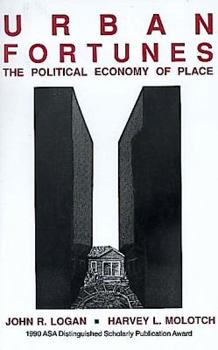Urban Fortunes: The Political Economy of Place
Select Format
Select Condition 
Book Overview
This sociological classic is updated with a new preface by the authors looking at developments in the study of urban planning during the twenty-year life of this influential work. This description may be from another edition of this product.
Format:Paperback
Language:English
ISBN:0520063414
ISBN13:9780520063419
Release Date:March 1988
Publisher:University of California Press
Length:383 Pages
Weight:0.98 lbs.
Dimensions:0.9" x 5.5" x 8.2"
Customer Reviews
3 ratings
A brilliant new way to look at cities
Published by Thriftbooks.com User , 15 years ago
Who rules cities? Logan and Molotch have a theory. This book lays it out, in fairly simple terms. It argues that landowners have a shared interest in "growth", i.e. increased property values (land's exchange-value), and are willing to do whatever it takes to get them, including taking over government. This puts them in conflict with residents who care about their neighborhoods (land's use-value) and don't want growth's unstoppable engine. It's a brilliant book, with insights on every page and some poignant stories as well. Logan and Molotch are sociologists, not writers, so the book drags at points, but it's well worth it for anyone who's interested in the subject. My major critique is that it underplays the importance of planning and doesn't provide a good explanation for it, but that's a rather minor criticism, all things considered. Highly recommended.
Amazing in its importance
Published by Thriftbooks.com User , 19 years ago
I feel compelled to write a short review because of the two negative reviews accompanying this listing. This book is an extension of the arguments in "The City as a Growth Machine," the seminal sociology article from 1976, by Harvey Molotch. Molotch's basic argument is that previously, local government and community studies focused on intra-elite competition and the like. His major point was that regardless of differences of opinion within the local political power structure, all in fact were united behind a "growth agenda" directed to an intensification of land uses and an increase in rents (the economics term, in the sense of the rentier class). The book extends these arguments much further. For example, one of the points made is about the "use value" versus the "exchange value" of place. The latter is about making money off place, the former about the intrinsic value of home, etc. The other major point (also in the article) is the growth machine's "value-free development" ideology, that growth is always good, adds jobs, etc. This book is as important to urban studies as Jane Jacobs _Death and Life of Great American Cities_. Whereas Jacobs focuses on design, density, and mixed uses; Logan and Molotch focus on the sociology, politics, and economics of local government. In the argot of today, they focus on the "back story." Sections on the role of sports, gambling, etc., in the growth machine efforts are no less worthwhile. Any one who is active on local land use issues will find this book to be a revelation. My only significant "criticism" is that the book is 17 years old and could use an updating with additional citations, etc. In short, this is an essential book.
Explaning the Deep Structure of Local Politics
Published by Thriftbooks.com User , 21 years ago
If you've ever tried to understand seeming arbitrary political decisions about land use, or why some growth issues are never discussed, or why certain transportation projects are funded and others are not, this book provides an structure of understanding local and regional politics in America in the late 20th century, one you won't find in Planning School or if you are in transportation engineering. It also tells how globalized capitalism is driving localplanning. Logan and Molotch's thesis is to local politics what Darwin evolutuionary concepts are to natural botony and natural history. You will never watch local government the sameway again after reading this book. This book is considered one of the most important books in sociology of the last 50 years, and won the American SociologyAssociation book-of-the-year award in 1990.If you are a died in the wool Cato-Institute/ American Enterprise Institution/Chicago School liberatian /free market-solved everything person, you won't like it. But if you want tohave a an alternate paradigms of how political economy of the the city works in your head, this provides a good alternative.






